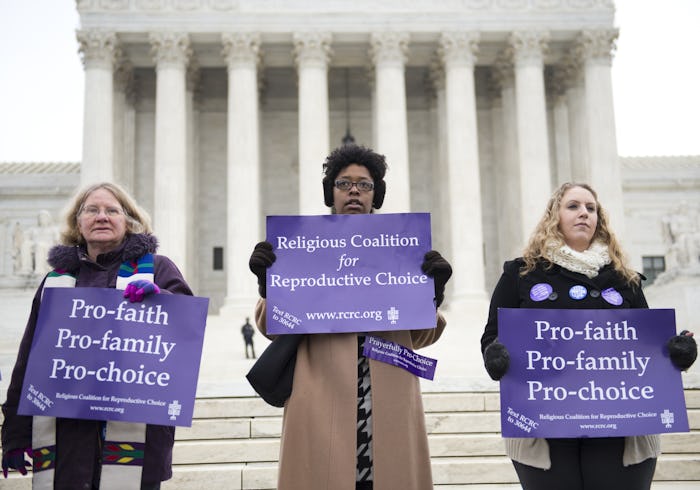News

Late-Term Abortion Laws By State Show It's Difficult For Women To Get The Care They Need
With the presidential election just over two weeks away, the issue of reproductive choice is once again on the ballot by proxy, as each presidential candidate has voiced their commitment to either protecting or eliminating a woman's right to bodily autonomy. The ongoing vacancy on the Supreme Court has put the legacy of Roe v. Wade in question, as the next president's SCOTUS appointee could tip the balance of the bench in either political direction. And yet, even though Roe v. Wade has been the law of the land on the legality of a woman's right to an abortion since 1973, states have chipped away and even dismantled women's access to reproductive healthcare bit by bit. Late-term abortion laws by state, for example, reveal a vast disparity of women's access to often necessary medical care.
First, what is a late-term abortion? It's helpful to have an understanding of the parameters. Late-term abortions typically refer to the termination of pregnancies after 20 weeks post-fertilization, which is often typically at 22 weeks gestation, according to The New York Times. It's important to contextualize late-term abortions in their medical context, as some anti-choice proponents falsely argue that late-term abortions are some kind of last minute change of heart by the mother; in truth, having a late-term abortion is far more emotionally and medically nuanced than just a casual surgical retraction on the idea of being a mom.
According to the Guttmacher Institute, 43 states currently have laws that prohibit abortions being performed after a certain number of weeks in a pregnancy. Here's a look at how late-term abortion laws vary by state — and why, come Nov. 8, every vote matters so that no more laws like these make it onto the books.
States That Ban Abortion After 20 Weeks
According to the Planned Parenthood Action Fund, only 1 percent of abortions occur after 21 weeks, and yet, 15 states have enacted bans on abortions at 20 weeks post-fertilization, including: Alabama, Arkansas, Georgia, Indiana, Kansas, Louisiana, Mississippi, Nebraska, North Carolina, North Dakota, Oklahoma, South Carolina, South Dakota, Texas, and Wisconsin.
States That Ban Abortion Entirely In The Third Trimester
According to The New York Times, three states ban abortions in the third trimester, after 28 weeks gestation. They include Iowa, Texas, and Virginia. The Guttmacher Institute also notes that in 24 states, late-term abortions are allowed to preserve the life and health of the mother, but more disturbingly, that 16 states ban late-term abortions entirely — the only exception being to save the life and physical health of the mother. Three states — Idaho, Michigan, and Rhode Island — have banned late-term abortions except those that would save the life of the mother and say nothing of physical health.
In these states, if a fetus dies in utero, the mother can have a late-term abortion only if the fetus will kill her. Just this year, these unnecessarily draconian abortion restrictions around "life and health of the mother" and "fetal pain" resulted in a Texas woman being forced to deliver her stillborn baby — four days after the fetus began falling out of her uterus, according to the Daily Beast.
The Exceptional Eight
Despite the looming and growing shadow of state abortion bans and restrictions throughout the country, there is some hope: Seven states, plus the District of Columbia, have no restrictions whatsoever for abortions after a certain point in a woman's pregnancy. Pro-choice props to Washington D.C., as well as Alaska, Colorado, New Hampshire, New Jersey, New Mexico, Oregon, and Vermont.
The Washington Post has a handy chart that details all 50 states, and what kinds of abortion restrictions exist for each state, as of 2013. But it's important to note that since 2011, 334 abortion restrictions have been put in place by states, accounting for a shocking third of all abortion restrictions since Roe v. Wade, according to the Guttmacher Institute — which makes this presidential election so critical to Roe v. Wade's continued survival, however hobbled it may already be.